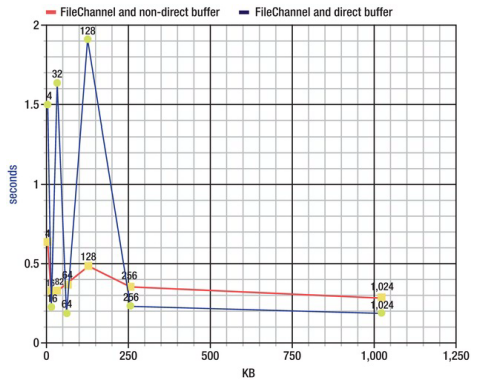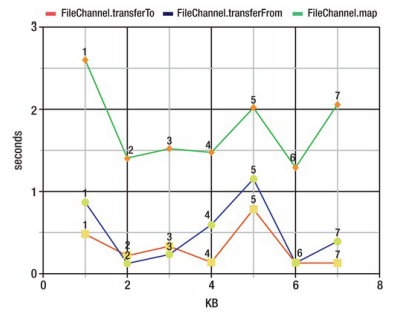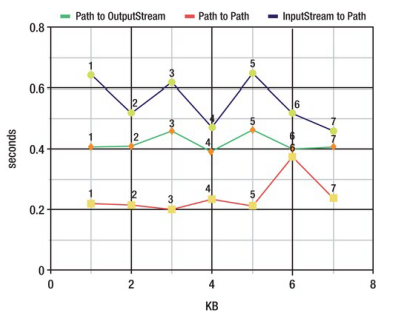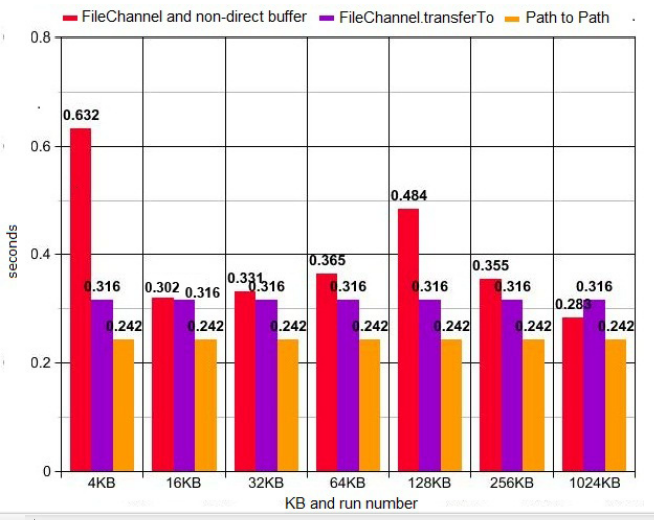目前为止,我们已经学习了很多 Java 拷贝文件的方式,除了 FileChannel 提供的方法外,还包括使用 Files.copy() 或使用字节数组的缓冲/非缓冲流。那个才是最好的选择呢?这个问题很难回答,因为答案基于很多因素。本文将目光集中到一个因素,那就是速度,因为拷贝任务 越快将会提高效率,在有些情况下,这是成功的关键。因此,本文将使用一个应用程序来比较下面这些拷贝方式的具体时间:
- FileChannel 和非直接模式的 ByteBuffer
- FileChannel 和直接模式的 ByteBuffer
- FileChannel.transferTo()
- FileChannel.transferFrom()
- FileChannel.map()
- 使用字节数组和缓冲流
- 使用字节数组和非缓冲流
- File.copy()(Path 到 Path,InputStream 到 Path 和 Path 到 OutputStream)
应用程序基于下面的条件:
- 拷贝文件类型 MP4 视频(文件名为 Rafa Best Shots.mp4,所在目录为 C: afaelnadal ournaments2009videos)
- 文件大小:58.3MB
- 测试的缓冲区大小:4KB, 16KB, 32KB, 64KB, 128KB, 256KB, and 1024KB
- 机器配置:Mobile AMD Sempron Processor 3400 + 1.80 GHz, 1.00GB RAM, 32-bit
OS, Windows 7 Ultimate - 测量类型:使用 System.nanoTime() 方法
- 连续运行三次后再获取时间;前三次运行将会被忽略。开始运行的时间总会比后面运行的时间要长一些。
下面将列出完整的应用程序:
import java.nio.MappedByteBuffer;
import java.io.OutputStream;
import java.io.InputStream;
import java.io.BufferedInputStream;
import java.io.BufferedOutputStream;
import java.io.File;
import java.io.FileInputStream;
import java.io.FileOutputStream;
import java.io.IOException;
import java.nio.ByteBuffer;
import java.nio.channels.FileChannel;
import java.nio.file.Files;
import java.nio.file.Path;
import java.nio.file.Paths;
import java.nio.file.StandardOpenOption;
import java.util.EnumSet;
import static java.nio.file.LinkOption.NOFOLLOW_LINKS;
public class Main {
public static void deleteCopied(Path path){
try {
Files.deleteIfExists(path);
} catch (IOException ex) {
System.err.println(ex);
}
}
public static void main(String[] args) {
final Path copy_from = Paths.get("C:/rafaelnadal/tournaments/2009/videos/
Rafa Best Shots.mp4");
final Path copy_to = Paths.get("C:/Rafa Best Shots.mp4");
long startTime, elapsedTime;
int bufferSizeKB = 4; //also tested for 16, 32, 64, 128, 256 and 1024
int bufferSize = bufferSizeKB * 1024;
deleteCopied(copy_to);
//FileChannel and non-direct buffer
System.out.println("Using FileChannel and non-direct buffer ...");
try (FileChannel fileChannel_from = (FileChannel.open(copy_from,
EnumSet.of(StandardOpenOption.READ)));
FileChannel fileChannel_to = (FileChannel.open(copy_to,
EnumSet.of(StandardOpenOption.CREATE_NEW, StandardOpenOption.WRITE)))) {
startTime = System.nanoTime();
// Allocate a non-direct ByteBuffer
ByteBuffer bytebuffer = ByteBuffer.allocate(bufferSize);
// Read data from file into ByteBuffer
int bytesCount;
while ((bytesCount = fileChannel_from.read(bytebuffer)) > 0) {
//flip the buffer which set the limit to current position, and position to 0
bytebuffer.flip();
//write data from ByteBuffer to file
fileChannel_to.write(bytebuffer);
//for the next read
bytebuffer.clear();
}
elapsedTime = System.nanoTime() - startTime;
System.out.println("Elapsed Time is " + (elapsedTime / 1000000000.0) + " seconds");
} catch (IOException ex) {
System.err.println(ex);
}
deleteCopied(copy_to);
//FileChannel and direct buffer
System.out.println("Using FileChannel and direct buffer ...");
try (FileChannel fileChannel_from = (FileChannel.open(copy_from,
EnumSet.of(StandardOpenOption.READ)));
FileChannel fileChannel_to = (FileChannel.open(copy_to,
EnumSet.of(StandardOpenOption.CREATE_NEW, StandardOpenOption.WRITE)))) {
startTime = System.nanoTime();
// Allocate a direct ByteBuffer
ByteBuffer bytebuffer = ByteBuffer.allocateDirect(bufferSize);
// Read data from file into ByteBuffer
int bytesCount;
while ((bytesCount = fileChannel_from.read(bytebuffer)) > 0) {
//flip the buffer which set the limit to current position, and position to 0
bytebuffer.flip();
//write data from ByteBuffer to file
fileChannel_to.write(bytebuffer);
//for the next read
bytebuffer.clear();
}
elapsedTime = System.nanoTime() - startTime;
System.out.println("Elapsed Time is " + (elapsedTime / 1000000000.0) + " seconds");
} catch (IOException ex) {
System.err.println(ex);
}
deleteCopied(copy_to);
//FileChannel.transferTo()
System.out.println("Using FileChannel.transferTo method ...");
try (FileChannel fileChannel_from = (FileChannel.open(copy_from,
EnumSet.of(StandardOpenOption.READ)));
FileChannel fileChannel_to = (FileChannel.open(copy_to,
EnumSet.of(StandardOpenOption.CREATE_NEW, StandardOpenOption.WRITE)))) {
startTime = System.nanoTime();
fileChannel_from.transferTo(0L, fileChannel_from.size(), fileChannel_to);
elapsedTime = System.nanoTime() - startTime;
System.out.println("Elapsed Time is " + (elapsedTime / 1000000000.0) + " seconds");
} catch (IOException ex) {
System.err.println(ex);
}
deleteCopied(copy_to);
//FileChannel.transferFrom()
System.out.println("Using FileChannel.transferFrom method ...");
try (FileChannel fileChannel_from = (FileChannel.open(copy_from,
EnumSet.of(StandardOpenOption.READ)));
FileChannel fileChannel_to = (FileChannel.open(copy_to,
EnumSet.of(StandardOpenOption.CREATE_NEW, StandardOpenOption.WRITE)))) {
startTime = System.nanoTime();
fileChannel_to.transferFrom(fileChannel_from, 0L, (int) fileChannel_from.size());
elapsedTime = System.nanoTime() - startTime;
System.out.println("Elapsed Time is " + (elapsedTime / 1000000000.0) + " seconds");
} catch (IOException ex) {
System.err.println(ex);
}
deleteCopied(copy_to);
//FileChannel.map
System.out.println("Using FileChannel.map method ...");
try (FileChannel fileChannel_from = (FileChannel.open(copy_from,
EnumSet.of(StandardOpenOption.READ)));
FileChannel fileChannel_to = (FileChannel.open(copy_to,
EnumSet.of(StandardOpenOption.CREATE_NEW, StandardOpenOption.WRITE)))) {
startTime = System.nanoTime();
MappedByteBuffer buffer = fileChannel_from.map(FileChannel.MapMode.READ_ONLY,
0, fileChannel_from.size());
fileChannel_to.write(buffer);
buffer.clear();
elapsedTime = System.nanoTime() - startTime;
System.out.println("Elapsed Time is " + (elapsedTime / 1000000000.0) + " seconds");
} catch (IOException ex) {
System.err.println(ex);
}
deleteCopied(copy_to);
//Buffered Stream I/O
System.out.println("Using buffered streams and byte array ...");
File inFileStr = copy_from.toFile();
File outFileStr = copy_to.toFile();
try (BufferedInputStream in = new BufferedInputStream(new FileInputStream(inFileStr));
BufferedOutputStream out = new BufferedOutputStream(new FileOutputStream(outFileStr))) {
startTime = System.nanoTime();
byte[] byteArray = new byte[bufferSize];
int bytesCount;
while ((bytesCount = in.read(byteArray)) != -1) {
out.write(byteArray, 0, bytesCount);
}
elapsedTime = System.nanoTime() - startTime;
System.out.println("Elapsed Time is " + (elapsedTime / 1000000000.0) + " seconds");
} catch (IOException ex) {
System.err.println(ex);
}
deleteCopied(copy_to);
System.out.println("Using un-buffered streams and byte array ...");
try (FileInputStream in = new FileInputStream(inFileStr);
FileOutputStream out = new FileOutputStream(outFileStr)) {
startTime = System.nanoTime();
byte[] byteArray = new byte[bufferSize];
int bytesCount;
while ((bytesCount = in.read(byteArray)) != -1) {
out.write(byteArray, 0, bytesCount);
}
elapsedTime = System.nanoTime() - startTime;
System.out.println("Elapsed Time is " + (elapsedTime / 1000000000.0) + " seconds");
} catch (IOException ex) {
System.err.println(ex);
}
deleteCopied(copy_to);
System.out.println("Using Files.copy (Path to Path) method ...");
try {
startTime = System.nanoTime();
Files.copy(copy_from, copy_to, NOFOLLOW_LINKS);
elapsedTime = System.nanoTime() - startTime;
System.out.println("Elapsed Time is " + (elapsedTime / 1000000000.0) + " seconds");
} catch (IOException e) {
System.err.println(e);
}
deleteCopied(copy_to);
System.out.println("Using Files.copy (InputStream to Path) ...");
try (InputStream is = new FileInputStream(copy_from.toFile())) {
startTime = System.nanoTime();
Files.copy(is, copy_to);
elapsedTime = System.nanoTime() - startTime;
System.out.println("Elapsed Time is " + (elapsedTime / 1000000000.0) + " seconds");
} catch (IOException e) {
System.err.println(e);
}
deleteCopied(copy_to);
System.out.println("Using Files.copy (Path to OutputStream) ...");
try (OutputStream os = new FileOutputStream(copy_to.toFile())) {
startTime = System.nanoTime();
Files.copy(copy_from, os);
elapsedTime = System.nanoTime() - startTime;
System.out.println("Elapsed Time is " + (elapsedTime / 1000000000.0) + " seconds");
} catch (IOException e) {
System.err.println(e);
}
}
}
输出结果排序比较复杂,其中包含了很多数据。下面我将主要的对比用图形的方式展示出来。图形中 Y 坐标表示消耗的时间(单位:秒),X 坐标表示缓冲的大小(或运行次数,跳过了前三次运行)。
FileChannel 和非直接模式 Buffer vs. FileChannel 和直接模式 Buffer
从下图看来,如果缓存小于 256KB,那么非直接模式的 Buffer 快一点,而缓存大于 256KB 后,直接模式的 Buffer 快一点:

FileChannel.transferTo() vs. FileChannel.transferFrom() vs. FileChannel.map()
从下图看来,FileChannel.transferTo() 和 FileChannel.transferFrom 运行七次的速度都差不多,而 FileChannel.map 的速度就要差很多:

三种 Files.copy() 方法
从下图看来,最快的是 Path 到 Path,其次是 Path 到 OutputStream,最慢的是 InputStream 到 Path:

FileChannel 和非直接模式 Buffer vs. FileChannel.transferTo() vs. Path 到 Path
最后,我们将前面最快的三种方式综合起来比较。从比较的结果来看,似乎 Path 到 Path 是最快的解决方案:
